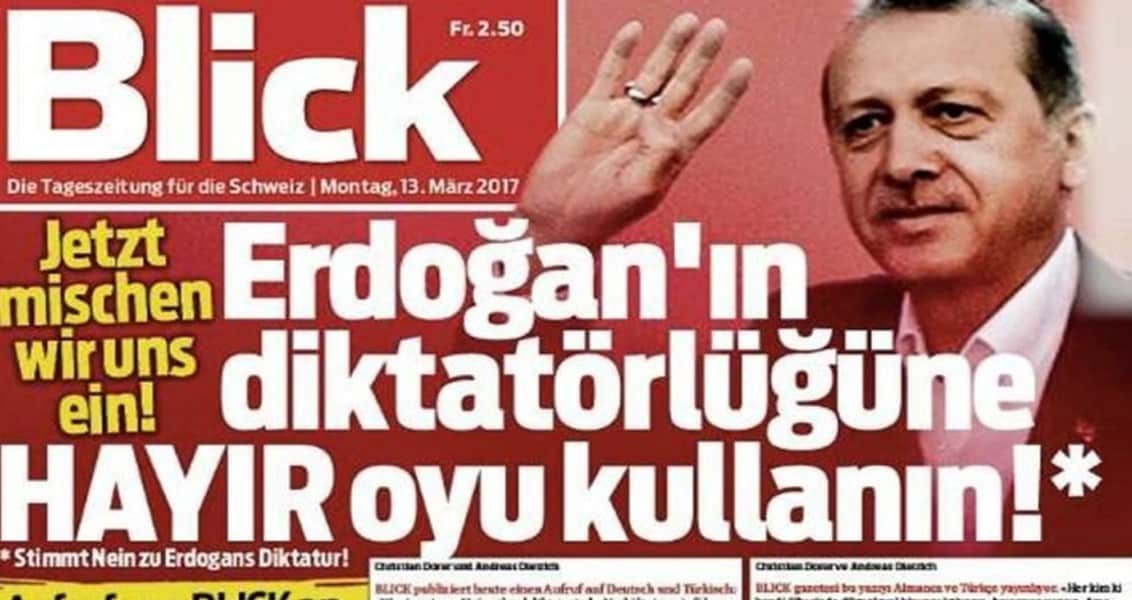
EU-Backed 'No' Campaign Plants Seeds of Xenophobia İn Turkey
With the April 16 constitutional referendum just three weeks away, both sides have fielded their heavyweights as part of a last-ditch effort to impress voters. The interference of European politicians and media outlets in the referendum in support of the "no" campaign completely politicized the process.
Share
In recent months, the Republican People's Party (CHP) and the Peoples' Democratic Party (HDP) made a deliberate effort to refrain from reducing the "no" campaign to anti-Erdoğanism – which, they thought, would play into the hands of the "yes" campaign. It would have been a huge mistake to polarize society by attacking the Turkish president, who crushed the July 15 coup attempt. However, the European media, Western politicians and PKK terrorists in Europe ended up making up for the domestic campaign's shortage of anti-Erdoğanism.
Ahead of the referendum, several European governments not only imposed a blanket ban on the "yes" campaign but also became involved in the campaign through newspapers, magazines, public broadcasters and politicians to make the case that Turkey would not be able to join the European Union if the constitutional reform package is adopted by the people. Europe's decision to stump for the "no" campaign, which was kicked off by a controversial report by the Venice Commission and German Chancellor Angela Merkel's statements, remains unchanged. In recent days, European Parliament's Committee on Foreign Affairs Chairman Elmar Brok urged Turks to vote against the proposed changes. Cem Özdemir, the co-chairman of the German Green Party, issued a statement reiterating their support to the "no" campaign. Meanwhile, the German newspaper Bild claimed that "Atatürk would have said 'no'" in a desperate attempt to convince undecided voters.
They should probably realize that invoking national symbols like the War of Independence, the Sevres Treaty and Atatürk – which are associated with sovereignty and the nation's survival - will undoubtedly benefit the "yes" campaign. Knowing perfectly well that this is the case, Erdoğan has been making strongly worded statements in response to Europe's threats and warning that European leaders have betrayed their values by succumbing to fascism. As a matter of fact, he went further and announced at the Turkish-British Tatlıdil Forum on Saturday that another referendum could be held after April 16 to ask the people whether to withdraw Turkey's EU membership bid. To be clear, his most recent statements have not only rendered Europe's "no" campaign ineffective but also moved to associate the upcoming vote with the country's independence more closely.
Meanwhile on the domestic front, the CHP leadership has been attacking individual amendments as part of a broader theme of one-man rule and regime change. In recent weeks, the main opposition party's messaging strategy moved from simplification to deliberate misinformation. In order to support the claim that the proposed system of government will be arbitrary, CHP Chairman Kemal Kılıçdaroğlu has been coming up with imaginary scenarios that happen to be technically impossible – such as presidents issuing decrees to seize private property. Obviously, he conveniently ignores the fact that the president cannot issue decrees regarding fundamental and political rights along with Article 35 of the Constitution, which stipulates that property rights can be restricted by laws alone. There are two major problems with the "no" campaign right now: First, Kılıçdaroğlu took President Erdoğan's warning to Europe – that terrorist groups would eventually hurt their own citizens — out of context to question whether he meant "that he was responsible for al-Qaida and Daesh." At a time when the West refuses to stand in solidarity with Turkey against terrorism, charging one's own country of complicity with terrorist groups is a destructive campaign strategy.
Meanwhile, the main opposition leader has been talking about refugees in an outright dangerous way. Desperately trying to incorporate Turkey's humanitarian efforts – in which the entire country takes pride - into the referendum campaign, Kılıçdaroğlu recently claimed that the government will "grant citizenship to 4 million Syrians if the constitutional changes are adopted." Making irresponsible statements about Syrians not paying taxes or waiting in line at hospitals is certainly an attempt to plant the seeds of xenophobia in Turkey.
[Daily Sabah, March 29, 2017]
Tags »
Related Articles








